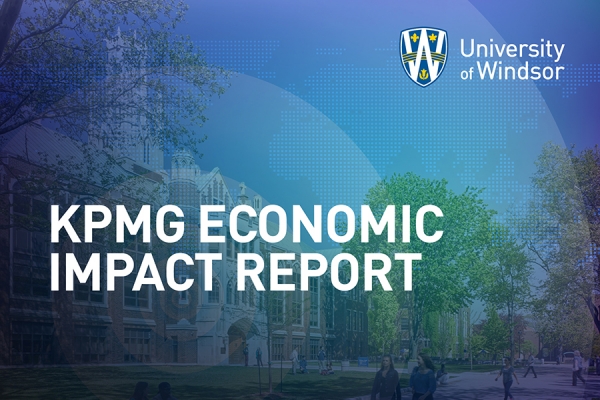 The University of Windsor continues to have a dramatic economic impact on the region and the nation, according to a new study by financial services firm KPMG.
The University of Windsor continues to have a dramatic economic impact on the region and the nation, according to a new study by financial services firm KPMG.
The University of Windsor continues to have a dramatic and transformative economic impact on the region, the province, and at a national level, according to a new study by financial services firm KPMG.
A recent Economic Impact Assessment concluded that as all universities prepare for future challenges, “UWindsor is uniquely placed to be a front-runner in meeting these challenges. This reflects its unique location at a major border and the depth and breadth of its educational programming.”
KPMG also points out that UWindsor is an active and important stakeholder in the Windsor-Essex region through the education and training of its students, and has contributed to the productivity and growth of the local economy by:
- Supporting local businesses in educating and providing a skilled labour force for the region, and investing nearly $88 million in the rejuvenation of downtown Windsor;
- Engaging in such community-focused activities, community placements, and mentoring programs as the Windsor International Film Festival, youth science fairs, nursing and legal aid clinics, and United Way initiatives;
- Partnering on community-based research to support public, non-profit, and community organizations, by providing accessible knowledge and research, as well as opportunities for experiential learning. The community benefits from 139,000 hours annually of practicum service hours by Master of Social Work candidates, more than 140,000 hours in nursing practicum services each year, and 30,000 hours of psychological services by graduate students serving clinical internships.
UWindsor president Rob Gordon said the study’s conclusions indicate the University’s objectives align with the needs of the community and show the institution is moving in the right direction.
“The University of Windsor has a strong commitment to the region we serve — not only through our teaching, learning, and research activities, but through vital collaborations with healthcare, law, social services, business, and other important partners in our community,” he said.
Other findings in the report:
- The total economic impact of the University of Windsor is estimated to be $669 million in gross domestic product throughout Canada. Based on 2018-19 data, this includes $523 million of operating, non-local student, and visitor expenditures, as well as $46 million in annual average capital expenditures. UWindsor is currently investing $30 million in the Transforming Windsor Law building renovation project, as well as $73 million in the new Lancer Sport and Recreation Centre.
- As a result of $359 million in annual operational expenditures, 3,797 jobs were generated in Canada, nearly all of them being local. As well, $207 million in salaries and benefits were paid to area employees. KPMG points out a large portion of employee incomes are spent on goods and services provided by local businesses, creating local jobs.
- Spending by non-local and international students in Windsor-Essex amounts to $134 million. KPMG says these expenditures support local businesses and contribute to the local economy’s vibrancy and vitality. Nearly one-quarter of the University’s 16,000 students are international.
- UWindsor attracts more than 36,000 visitors to the region annually resulting in spending of $30 million. This includes sporting events, alumni events, and orientation week.
The University receives about $27 million in federal funding annually, directed at research in a wide variety of fields both locally and across the country. These include:
- The Great Lakes Institute for Environmental Research (GLIER), noted as North America’s leading freshwater aquatic research facility;
- Cutting-edge automotive research conducted in collaboration with Fiat Chrysler (Stellantis) in the Applied Research and Development Centre, as well as with the Ford Motor Company in the development of higher-efficiency diesel and electric motors;
- The WE-Spark Health Institute, a partnership involving the University of Windsor, Hotel-Dieu Grace Healthcare, St. Clair College and Windsor Regional Hospital. WE-Spark enhances the health, well-being and care of people through transformative research and knowledge translation;
- The Cross-Border Institute, dedicated to making a better and more efficient Canada-U.S. border. The institute also works with municipal and civic organizations in Windsor-Essex to promote regional development as a hub for cross-border logistics.
- The Centre for Hybrid Automotive Research and Green Energy Lab, focusing on five core areas for research into electric vehicles — electric machine design, electric machine testing, machine drives and control, inductive and conductive charging, and electric vehicle simulation and testing.
KPMG concludes that, “over the years UWindsor has made many contributions to the economy both locally and nationally. As the University continues to grow and expand, and to further its goal of becoming more regionally and internationally relevant, these impacts will continue.
“These impacts will be key to attract, retain, and educate talented students, retain well-qualified faculty and staff, and to grow its research and program capabilities. As it does so, UWindsor will continue to generate positive social and economic impacts for students, the local and regional economies, and the research sphere.”
